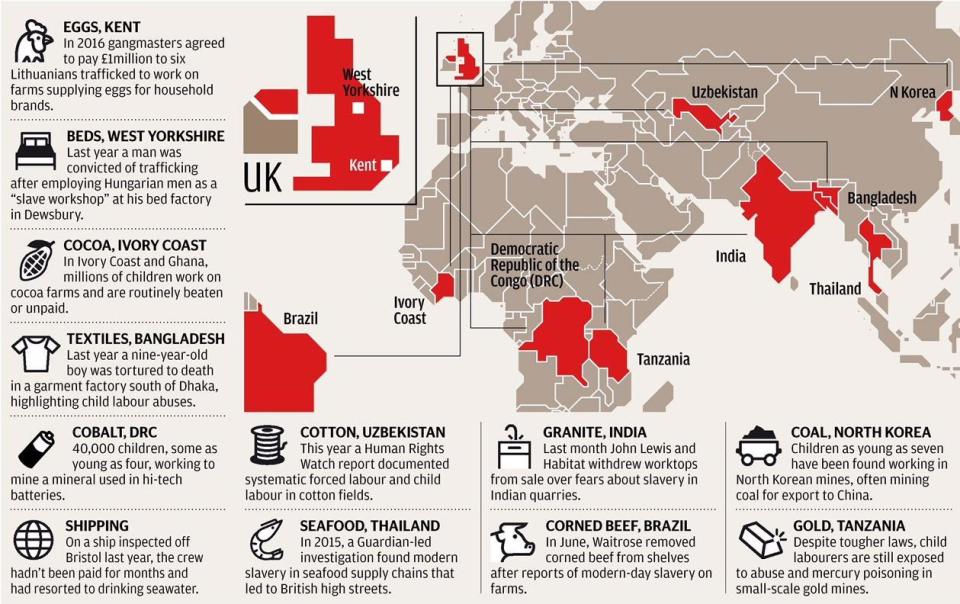Slaves on our Streets: Corporate leaders must do more to stop modern slavery, says Sir Bernard Hogan-Howe

Sir Bernard Hogan-Howe today called on Britain’s corporate leaders to do more to combat exploitation in their supply chains. The former Met Commissioner, who is leading The Independent’s special investigation into modern slavery, has written to hundreds of chief executives, chairmen and entrepreneurs.
His letter urges them to sign up to a statement that he has drafted pledging greater vigilance against slavery. “It’s a basic human right not to be enslaved to your employer,” he said. “We abolished it nearly 200 years ago, but it’s still happening around the world. Supply chains are one of the best opportunities to stop it.
“There are financial and environmental reasons for having transparent supply chains — trafficking is just another thing that needs to be checked.”
Shoppers have a responsibility too, he added. “We all look for something cheaper when we’re shopping, but we don’t always ask ourselves why it is cheaper. We need to make sure we aren’t contributing to the problem.”
Under the Modern Slavery Act 2015, businesses with a stock market value of more than £36 million must state on their website the steps they have taken. But according to a report published earlier this week by the Business and Human Rights Resource Centre (BHRRC), many businesses were failing in their duty. Of the FTSE 100 listed companies, 43 were found to be failing in their duties.

The report found that Marks & Spencer, Sainsbury’s and Unilever were among a handful of firms taking the lead on this issue, while among the worst performing were Hargreaves Lansdown, Pearson and WorldPay.
All three companies responded with statements underlining their commitment to fighting modern slavery. A WorldPay representative said it was “strongly opposed to slavery and human trafficking”. Hargreaves Lansdown said it was committed to ensuring that there was “no modern slavery or human trafficking in our supply chains or in any part of our business”.
A Pearson spokesman said they were “strongly committed to eliminating forced and compulsory labour”.
PHIL Bloomer, executive director for the BHRRC, said: “It’s disappointing that after the first full year of reporting under the Act, so many of the FTSE 100 companies are still taking a ‘tick box’ approach. Those that are leading the way prove there has been enough time to act decisively to eliminate slavery from their operations and supply chains.”
In recent years, stories from around the world have revealed how slavery taints the supply chains of products for sale in Britain.
Waitrose pulled corned beef over concerns about Brazilian farms and John Lewis withdrew kitchen counters for fear the granite came from exploitative mines. But the problem is not exclusive to the developing world. Early last year it was reported that Hungarian men had been forced to manufacture beds in West Yorkshire for as little as £10 a week, sleeping 45 to a house.
Genevieve LeBaron, a political scientist at the University of Sheffield and one of Britain’s leading anti-slavery researchers, said part of the problem was the tendency to focus on products rather than labour.
She said: “Most governance systems follow products, rather than labour. A hotel or restaurant might be able to tell you the farm a carrot came from but have no idea where the workers in its kitchens came from.”
She added that the Government should ensure better co-ordination between immigration law and employment practice. Many victims in the UK are migrants.
By encouraging businesses and consumers to apply greater scrutiny, Sir Bernard hopes to help remove the conditions that allow slavery to flourish. He said: “It’s complex, and it can be hard for individual companies but where there’s a will, there’s a way.”
Visit Freedom United's action hub for The Independent

 Yahoo News
Yahoo News 
